- Home
- Albert Camus
The Myth of Sisyphus and Other Essays Page 4
The Myth of Sisyphus and Other Essays Read online
Page 4
Everything is sacrificed here to the irrational, and, the demand for clarity being conjured away, the absurd disappears with one of the terms of its comparison. The absurd man, on the other hand, does not undertake such a leveling process. He recognizes the struggle, does not absolutely scorn reason, and admits the irrational. Thus he again embraces in a single glance all the data of experience and he is little inclined to leap before knowing. He knows simply that in that alert awareness there is no further place for hope.
What is perceptible in Leo Chestov will be perhaps even more so in Kierkegaard. To be sure, it is hard to outline clear propositions in so elusive a writer. But, despite apparently opposed writings, beyond the pseudonyms, the tricks, and the smiles, can be felt throughout that work, as it were, the presentiment (at the same time as the apprehension) of a truth which eventually bursts forth in the last works: Kierkegaard likewise takes the leap. His childhood having been so frightened by Christianity, he ultimately returns to its harshest aspect. For him, too, antinomy and paradox become criteria of the religious. Thus, the very thing that led to despair of the meaning and depth of this life now gives it its truth and its clarity. Christianity is the scandal, and what Kierkegaard calls for quite plainly is the third sacrifice required by Ignatius Loyola, the one in which God most rejoices: “The sacrifice of the intellect.” [6]
This effect of the “leap” is odd, but must not surprise us any longer. He makes of the absurd the criterion of the other world, whereas it is simply a residue of the experience of this world. “In his failure,” says Kierkegaard, “the believer finds his triumph.”
It is not for me to wonder to what stirring preaching this attitude is linked. I merely have to wonder if the spectacle of the absurd and its own character justifies it. On this point, I know that it is not so. Upon considering again the content of the absurd, one understands better the method that inspired Kierkegaard. Between the irrational of the world and the insurgent nostalgia of the absurd, he does not maintain the equilibrium. He does not respect the relationship that constitutes, properly speaking, the feeling of absurdity. Sure of being unable to escape the irrational, he wants at least to save himself from that desperate nostalgia that seems to him sterile and devoid of implication. But if he may be right on this point in his judgment, he could not be in his negation. If he substitutes for his cry of revolt a frantic adherence, at once he is led to blind himself to the absurd which hitherto enlightened him and to deify the only certainty he henceforth possesses, the irrational. The important thing, as Abbe Galiani said to Mme d’Epinay, is not to be cured, but to live with one’s ailments. Kierkegaard wants to be cured. To be cured is his frenzied wish, and it runs throughout his whole journal. The entire effort of his intelligence is to escape the antinomy of the human condition. An all the more desperate effort since he intermittently perceives its vanity when he speaks of himself, as if neither fear of God nor piety were capable of bringing him to peace. Thus it is that, through a strained subterfuge, he gives the irrational the appearance and God the attributes of the absurd: unjust, incoherent, and incomprehensible. Intelligence alone in him strives to stifle the underlying demands of the human heart. Since nothing is proved, everything can be proved.
Indeed, Kierkegaard himself shows us the path taken. I do not want to suggest anything here, but how can one fail to read in his works the signs of an almost intentional mutilation of the soul to balance the mutilation accepted in regard to the absurd? It is the leitmotiv of the Journal. “What I lacked was the animal which also belongs to human destiny .... But give me a body then.” And further on: “Oh! especially in my early youth what should I not have given to be a man, even for six months ... what I lack, basically, is a body and the physical conditions of existence.” Elsewhere, the same man nevertheless adopts the great cry of hope that has come down through so many centuries and quickened so many hearts, except that of the absurd man. “But for the Christian death is certainly not the end of everything and it implies infinitely more hope than life implies for us, even when that life is overflowing with health and vigor.” Reconciliation through scandal is still reconciliation. It allows one perhaps, as can be seen, to derive hope of its contrary, which is death. But even if fellow-feeling inclines one toward that attitude, still it must be said that excess justifies nothing. That transcends, as the saying goes, the human scale; therefore it must be superhuman. But this “therefore” is superfluous. There is no logical certainty here. There is no experimental probability either. All I can say is that, in fact, that transcends my scale. If I do not draw a negation from it, at least I do not want to found anything on the incomprehensible. I want to know whether I can live with what I know and with that alone. I am told again that here the intelligence must sacrifice its pride and the reason bow down. But if I recognize the limits of the reason, I do not therefore negate it, recognizing its relative powers. I merely want to remain in this middle path where the intelligence can remain clear. If that is its pride, I see no sufficient reason for giving it up. Nothing more profound, for example, than Kierkegaard’s view according to which despair is not a fact but a state: the very state of sin. For sin is what alienates from God. The absurd, which is the metaphysical state of the conscious man, does not lead to God.[7] Perhaps this notion will become clearer if I risk this shocking statement: the absurd is sin without God.
It is a matter of living in that state of the absurd I know on what it is founded, this mind and this world straining against each other without being able to embrace each other. I ask for the rule—of life of that state, and what I am offered neglects its basis, negates one of the terms of the painful opposition, demands of me a resignation. I ask what is involved in the condition I recognize as mine; I know it implies obscurity and ignorance; and I am assured that this ignorance explains everything and that this darkness is my light. But there is no reply here to my intent, and this stirring lyricism cannot hide the paradox from me. One must therefore turn away. Kierkegaard may shout in warning: “If man had no eternal consciousness, if, at the bottom of everything, there were merely a wild, seething force producing everything, both large and trifling, in the storm of dark passions, if the bottomless void that nothing can fill underlay all things, what would life be but despair?” This cry is not likely to stop the absurd man. Seeking what is true is not seeking what is desirable. If in order to elude the anxious question: “What would life be?” one must, like the donkey, feed on the roses of illusion, then the absurd mind, rather than resigning itself to falsehood, prefers, to adopt fearlessly Kierkegaard’s reply: “despair.” Everything considered, a determined soul will always manage.
***
I am taking the liberty at this point of calling the existential attitude philosophical suicide. But this does not imply a judgment. It is a convenient way of indicating the movement by which a thought negates itself and tends to transcend itself in its very negation. For the existentials negation is their God. To be precise, that god is maintained only through the negation of human reason.[8] But, like suicides, gods change with men. There are many ways of leaping, the essential being to leap. Those redeeming negations, those ultimate contradictions which negate the obstacle that has not yet been leaped over, may spring just as well (this is the paradox at which this reasoning aims) from a certain religious inspiration as from the rational order. They always lay claim to the eternal, and it is solely in this that they take the leap.
It must be repeated that the reasoning developed in this essay leaves out altogether the most widespread spiritual attitude of our enlightened age: the one, based on the principle that all is reason, which aims to explain the world. It is natural to give a clear view of the world after accepting the idea that it must be clear. That is even legitimate, but does not concern the reasoning we are following out here. In fact, our aim is to shed light upon the step taken by the mind when, starting from a philosophy of the world’s lack of meaning, it ends up by finding a meaning and depth in it. The most touching of those steps
is religious in essence; it becomes obvious in the theme of the irrational. But the most paradoxical and most significant is certainly the one that attributes rational reasons to a world it originally imagined as devoid of any guiding principle. It is impossible in any case to reach the consequences that concern us without having given an idea of this new attainment of the spirit of nostalgia.
I shall examine merely the theme of “the Intention” made fashionable by Husserl and the phenomenologists. I have already alluded to it. Originally Husserl’s method negates the classic procedure of the reason. Let me repeat. Thinking is not unifying or making the appearance familiar under the guise of a great principle. Thinking is learning all over again how to see, directing one’s consciousness, making of every image a privileged place. In other words, phenomenology declines to explain the world, it wants to be merely a description of actual experience. It confirms absurd thought in its initial assertion that there is no truth, but merely truths. From the evening breeze to this hand on my shoulder, everything has its truth. Consciousness illuminates it by paying attention to it. Consciousness does not form the object of its understanding, it merely focuses, it is the act of attention, and, to borrow a Bergsonian image, it resembles the projector that suddenly focuses on an image. The difference is that there is no scenario, but a successive and incoherent illustration. In that magic lantern all the pictures are privileged. Consciousness suspends in experience the objects of its attention. Through its miracle it isolates them. Henceforth they are beyond all judgments. This is the “intention” that characterizes consciousness. But the word does not imply any idea of finality; it is taken in its sense of “direction”: its only value is topographical.
At first sight, it certainly seems that in this way nothing contradicts the absurd spirit. That apparent modesty of thought that limits itself to describing what it declines to explain, that intentional discipline whence results paradoxically a profound enrichment of experience and the rebirth of the world in its prolixity are absurd procedures. At least at first sight. For methods of thought, in this case as elsewhere, always assume two aspects, one psychological and the other metaphysical.[9] Thereby they harbor two truths. If the theme of the intentional claims to illustrate merely a psychological attitude, by which reality is drained instead of being explained, nothing in fact separates it from the absurd spirit. It aims to enumerate what it cannot transcend. It affirms solely that without any unifying principle thought can still take delight in describing and understanding every aspect of experience. The truth involved then for each of those aspects is psychological in nature. It simply testifies to the “interest” that reality can offer. It is a way of awaking a sleeping world and of making it vivid to the mind. But if one attempts to extend and give a rational basis to that notion of truth, if one claims to discover in this way the “essence” of each object of knowledge, one restores its depth to experience. For an absurd mind that is incomprehensible. Now, it is this wavering between modesty and assurance that is noticeable in the intentional attitude, and this shimmering of phenomenological thought will illustrate the absurd reasoning better than anything else.
For Husserl speaks likewise of “extra-temporal essences” brought to light by the intention, and he sounds like Plato. All things are not explained by one thing but by all things. I see no difference. To be sure, those ideas or those essences that consciousness “effectuates” at the end of every description are not yet to be considered perfect models. But it is asserted that they are directly present in each datum of perception. There is no longer a single idea explaining everything, but an infinite number of essences giving a meaning to an infinite number of objects. The world comes to a stop, but also lights up. Platonic realism becomes intuitive, but it is still realism. Kierkegaard was swallowed up in his God; Parmenides plunged thought into the One. But here thought hurls itself into an abstract polytheism. But this is not all: hallucinations and fictions likewise belong to “extra-temporal essences.” In the new world of ideas, the species of centaurs collaborates with the more modest species of metropolitan man.
For the absurd man, there was a truth as well as a bitterness in that purely psychological opinion that all aspects of the world are privileged. To say that everything is privileged is tantamount to saying that everything is equivalent. But the metaphysical aspect of that truth is so far-reaching that through an elementary reaction he feels closer perhaps to Plato. He is taught, in fact, that every image presupposes an equally privileged essence. In this ideal world without hierarchy, the formal army is composed solely of generals. To be sure, transcendency had been eliminated. But a sudden shift in thought brings back into the world a sort of fragmentary immanence which restores to the universe its depth.
Am I to fear having carried too far a theme handled with greater circumspection by its creators? I read merely these assertions of Husserl, apparently paradoxical yet rigorously logical if what precedes is accepted: “That which is true is true absolutely, in itself; truth is one, identical with itself, however different the creatures who perceive it, men, monsters, angels or gods.” Reason triumphs and trumpets forth with that voice, I cannot deny. What can its assertions mean in the absurd world? The perception of an angel or a god has no meaning for me. That geometrical spot where divine reason ratifies mine will always be incomprehensible to me. There, too, I discern a leap, and though performed in the abstract, it nonetheless means for me forgetting just what I do not want to forget. When farther on Husserl exclaims: “If all masses subject to attraction were to disappear, the law of attraction would not be destroyed but would simply remain without any possible application,” I know that I am faced with a metaphysic of consolation. And if I want to discover the point where thought leaves the path of evidence, I have only to reread the parallel reasoning that Husserl voices regarding the mind: “If we could contemplate clearly the exact laws of psychic processes, they would be seen to be likewise eternal and invariable, like the basic laws of theoretical natural science. Hence they would be valid even if there were no psychic process.” Even if the mind were not, its laws would be! I see then that of a psychological truth Husserl aims to make a rational rule: after having denied the integrating power of human reason, he leaps by this expedient to eternal Reason.
Husserl’s theme of the “concrete universe” cannot then surprise me. If I am told that all essences are not formal but that some are material, that the first are the object of logic and the second of science, this is merely a question of definition. The abstract, I am told, indicates but a part, without consistency in itself, of a concrete universal. But the wavering already noted allows me to throw light on the confusion of these terms. For that may mean that the concrete object of my attention, this sky, the reflection of that water on this coat, alone preserve the prestige of the real that my interest isolates in the world. And I shall not deny it. But that may mean also that this coat itself is universal, has its particular and sufficient essence, belongs to the world of forms. I then realize that merely the order of the procession has been changed. This world has ceased to have its reflection in a higher universe, but the heaven of forms is figured in the host of images of this earth. This changes nothing for me. Rather than encountering here a taste for the concrete, the meaning of the human condition, I find an intellectualism sufficiently unbridled to generalize the concrete itself.
* * *
It is futile to be amazed by the apparent paradox that leads thought to its own negation by the opposite paths of humiliated reason and triumphal reason. From the abstract god of Husserl to the dazzling god of Kierkegaard the distance is not so great. Reason and the irrational lead to the same preaching. In truth the way matters but little; the will to arrive suffices. The abstract philosopher and the religious philosopher start out from the same disorder and support each other in the same anxiety. But the essential is to explain. Nostalgia is stronger here than knowledge. It is significant that the thought of the epoch is at once one of the most deeply imbued with a phil
osophy of the non-significance of the world and one of the most divided in its conclusions. It is constantly oscillating between extreme rationalization of reality which tends to break up that thought into standard reasons and its extreme irrationalization which tends to deify it. But this divorce is only apparent. It is a matter of reconciliation, and, in both cases, the leap suffices. It is always wrongly thought that the notion of reason is a oneway notion. To tell the truth, however rigorous it may be in its ambition, this concept is nonetheless just as unstable as others. Reason bears a quite human aspect, but it also is able to turn toward the divine. Since Plotinus, who was the first to reconcile it with the eternal climate, it has learned to turn away from the most cherished of its principles, which is contradiction, in order to integrate into it the strangest, the quite magic one of participation.[10] It is an instrument of thought and not thought itself. Above all, a man’s thought is his nostalgia.

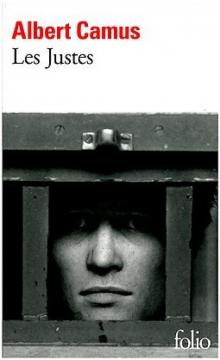 Les Justes
Les Justes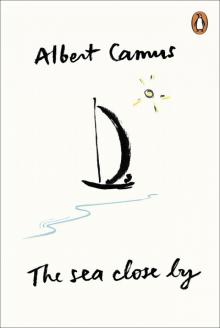 The Sea Close By
The Sea Close By The Stranger
The Stranger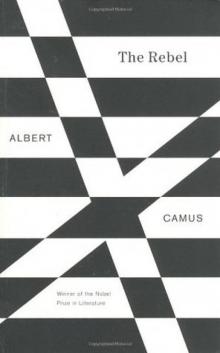 The Rebel: An Essay on Man in Revolt
The Rebel: An Essay on Man in Revolt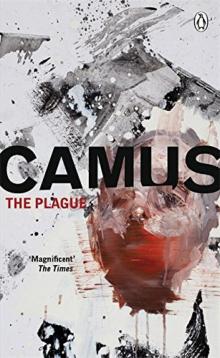 The plague
The plague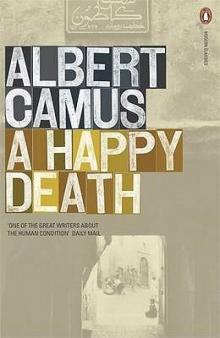 A Happy Death
A Happy Death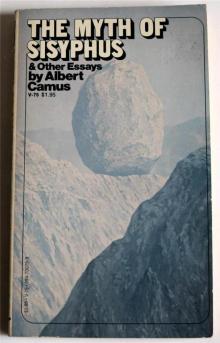 The Myth of Sisyphus and Other Essays
The Myth of Sisyphus and Other Essays The Fall
The Fall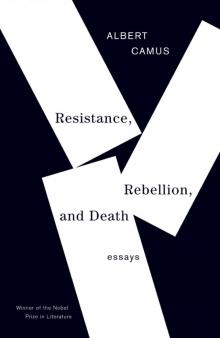 Resistance, Rebellion, and Death
Resistance, Rebellion, and Death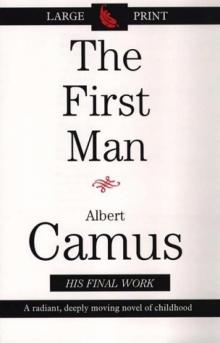 The First Man
The First Man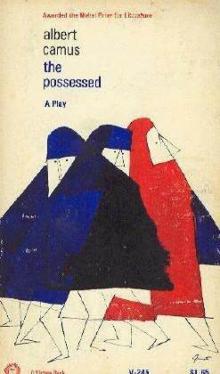 The Possessed
The Possessed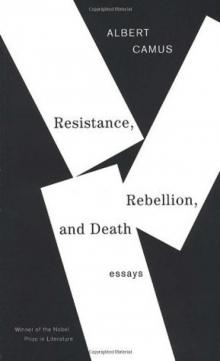 Resistance, Rebellion and Death: Essays
Resistance, Rebellion and Death: Essays